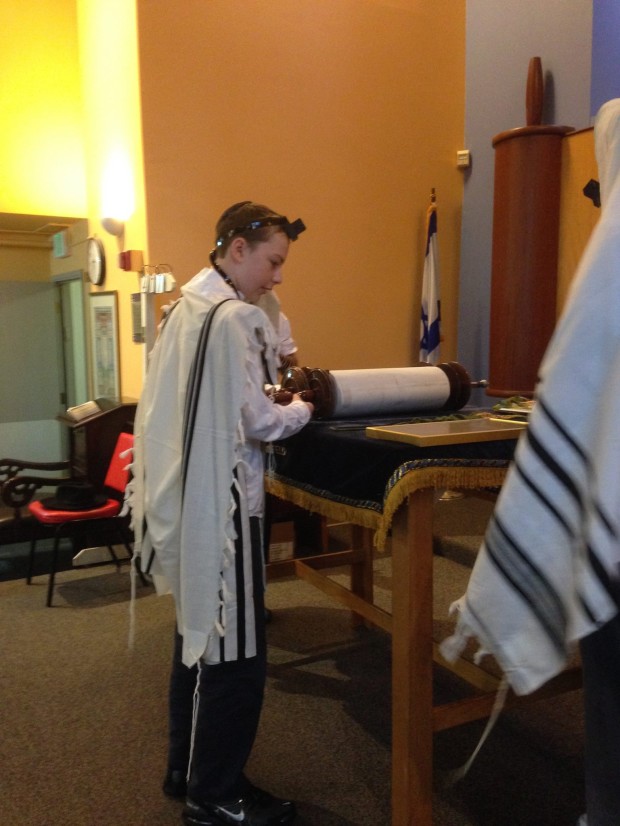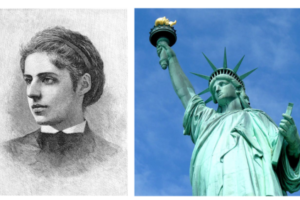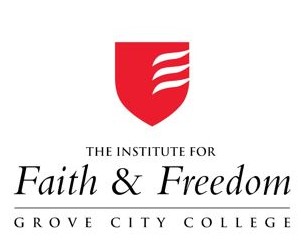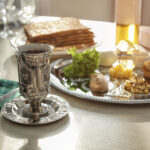Guest Blog by Ezra Klinghoffer

A note from Michael Medved: Since my own Bar Mitzvah in October of 1961, I’ve attended scores of these coming of age occasions for 13-year-old Jewish boys. In most cases, the young man delivers a few remarks about the significance of this milestone, but I’ve never heard or read Bar Mitzvah speeches as effective and moving as the remarks by 13-year-old Ezra Klinghoffer and by his father, my good friend, David Klinghoffer.
—
EZRA’S BAR MITZVAH SPEECH
When a Jewish boy turns 13, he reaches the age of adulthood, in the sense that he is now obliged in all the Torah’s commandments, the mitzvot. Up until now you may have seen me sitting with my dad in shul, reading a novel the whole time. I especially like fantasy, swords and sorcery, dragons, hobbits, J.R.R. Tolkien, that sort of thing. In fact you may have seen me walking to shul to with a novel in my hand, reading as I go and trying not to trip over my little brothers.
As a Bar Mitzvah, considered an adult in Jewish eyes, I’ll be putting aside my fantasy novels, briefly, and joining the adult Jewish community in prayer and all the rest of Jewish life.
Anyway, that’s the idea.
A Bar Mitzvah means a “son of the commandments.” According to our tradition, the Torah includes exactly 613 commandments, and my Torah reading today from the book of Devarim, or Deuteronomy, concludes with number 613.
Every week Jews around the world read the same parshah, or portion, from the Five Books of Moses. In the course of a year, we make our way from the beginning of Genesis to the end of Deuteronomy, from Creation through the lives of Abraham, Isaac and Jacob, the Exodus from Egypt, the giving of the Torah, and finally the death of Moses.
With my parshah, Nitzavim-Vayelech, we have now reached the end of Moses’ life and he is saying farewell to the Jewish people he lead out of Egypt. Moshe calls the Jews to renew their covenant with God, explains that the Torah and thus God’s voice is very near to us always, urges us to choose life over death, and finally directs us to write out for ourselves a song. That is the 613th mitzvah.
What song? The verse reads, “Now therefore write down for yourselves this song, and teach it to the people of Israel. Put it in their mouths, that this song may be my witness within the people of Israel.” The plain meaning of the words seems to refer to the song directly following in Chapter 32, in the following parshah, Haazinu. However in the Talmud, tractate Sanhedrin, the sage Rabbah explains that a commandment is given here to every Jew to write his own copy of the entire Torah. How so?
In a simple sense, copying the text of Haazinu requires copying the entire Torah. Why? Because the Talmud also explains that we don’t write just a part of a Torah. If we are going to copy Haazinu we must also copy the rest of the Five Books of Moses.
From this comes the mitzvah, the 613th, that every Jew must write out his own sefer Torah. The obligation can be fulfilled by doing so personally, by hiring a sage to write it for you, by writing even a letter in a Torah scroll, or according to some opinions even by purchasing books explaining the meanings hidden in the Torah.
One of those meanings is explained by Rabbi Lord Jonathan Sacks, former chief rabbi of the United Kingdom. He cites the view of a great rabbi of the 19th century, the Netziv, Rabbi Naftali Zvi Yehudah Berlin, that the entire Torah is literally to be understood as a song.
Understanding the Torah as a song rather than as prose — the kind of writing you’ll find in a novel or a newspaper — helps explain many things.
Here’s one. I’ve referred to my parshah as a “reading” but that’s not really correct. Rather than read from the Torah, in a public setting like this, we sing from it — as I’ve just done. Jewish prayer is typically sung rather than recited, with music especially associated with particular holy days, with Shabbat, or other occasions. We sing from the Torah one way and from other books of the Bible in other ways, using a different “trop” or cantillation, a unique tune, which the singer has to memorize since the notes are not given in the scroll.
Since the Torah is a song, God’s song, we also need to be careful not to interpret it as if it were a novel, or a newspaper. Songs communicate their truths in a much richer, more mysterious and indirect way than a newspaper does.
A newspaper has only one level of meaning. It means just exactly what it seems to mean on a first reading.
With song, with music, the more we listen, the more we appreciate and understand. Great music never reveals everything it has to offer on your first listening to it. The greatest music never exhausts itself, no matter how many times you have listened to it. Or so my mom tells me.
The same is true of the Torah. As a Bar Mitzvah I know my understanding of Torah will grow deeper and more mature with the years and decades, as I mature.
Song is also very individual. Take the same piece of music, the same notes and words, and give it to a hundred different singers. You’ll get a hundred different individual versions of the song. Every human voice is completely unique. A singer expresses his individuality, personality and soul in the way he sings.
Torah is the same way. There is a single text, carefully copied by sages and ordinary people from generation to generation, down from Moses who received it from God. Scribes are meticulously careful not to permit an error in even the tiniest detail of a single letter. A tiny, tiny error renders a whole Torah scroll invalid.
The mitzvot are the same, conveyed in the oral and written traditions, for Jews everywhere. We teach them meticulously to our children, down through thousands of years. In the words of the Led Zeppelin song, “The Song Remains the Same.”
At the same time, every person expresses his personality in the way — the tune — that he performs the mitzvot. No one’s prayers are the same as anyone’s else, despite being expressed — in our ancient liturgy — in the same words. No one’s acts of tzedakah, of charity, are the same as anyone else’s. No one’s relationship with God is the same. And so on.
Jewish life is our song to God and we each sing it differently from the way anyone else ever did or ever will.
The Torah is also a duet, not just a solo performance. It is our song to God, but remember that it was His song before it was ours. The Midrash says that God in creating the world looked in the Torah — as an architect in building a house would look in his blueprints. God is an architect. But I think He’s also a singer.
A beautiful image is suggested by my favorite fantasy author, J.R.R. Tolkien. In his book The Silmarillion, Tolkien tells the history of his mythical world, Middle Earth, before the events of The Hobbit and The Lord of the Rings, going back to a creation story.
In the beginning, writes Tolkien, the One God taught song to his angelic beings, the Ainur, who sang before him just as we know angels do before the God of Israel. In this way, as Tolkien tells it, God used song to create his world.
Is it going too far to say our God, Hashem, not only spoke but, using the Torah as His instrument and His song, sang the world into existence?
Tolkien, you should know, as a scholar of language at Oxford University, besides being an expert in many world tongues and a student of the Hebrew Bible, was also an ohev Yisrael, a lover of the Jewish people.
The Hobbit, including the movie version that I’ve seen umpteen times — the next installment, Part III, will be out soon, and I can’t wait! Dad, when does that come out?
Dad: “December 17th.”
Oh yeah. It’s going to be great.
Where was I? Oh right…arguably The Hobbit, has a Jewish theme.
It involves a group of heroes — Dwarves — seeking to win back their ancestral homeland from a Dragon, with the unexpected help of a Hobbit. Tolkien explained that he saw similarities between his Dwarves — longing for their ancient home — and the Jews. He even included similarities between his imaginary Dwarvish language, its grammar and script, and Hebrew.
The story of The Return of the King, the third volume of The Lord of the Rings, is messianic in a very Jewish way, involving a lost and wandering royal family finally defeating evil and returning to rightful leadership in their land.
In 1938, a German publisher under Nazi direction sought permission to translate and publish The Hobbit in Germany and asked for proof that Tolkien was of “Aryan” background. Apparently they thought his name might sound Jewish. Tolkien replied harshly.
“If I am to understand that you are enquiring whether I am of Jewish origin, I can only reply that I regret that I appear to have no ancestors of that gifted people.”
Later he explained that his last name was German: “It is not Jewish in origin, though I should consider it an honor if it were.”
Every Bar Mitzvah should be as proud of his Jewish heritage — to contribute his voice, his melody, to the song of Jewish history — as J.R.R. Tolkien insisted that he would be if could say he was of Jewish descent.
—–
Read “Thoughts on the Occasion of My Son’s Bar Mitzvah” by Ezra’s father, David Klinghoffer, here.




















